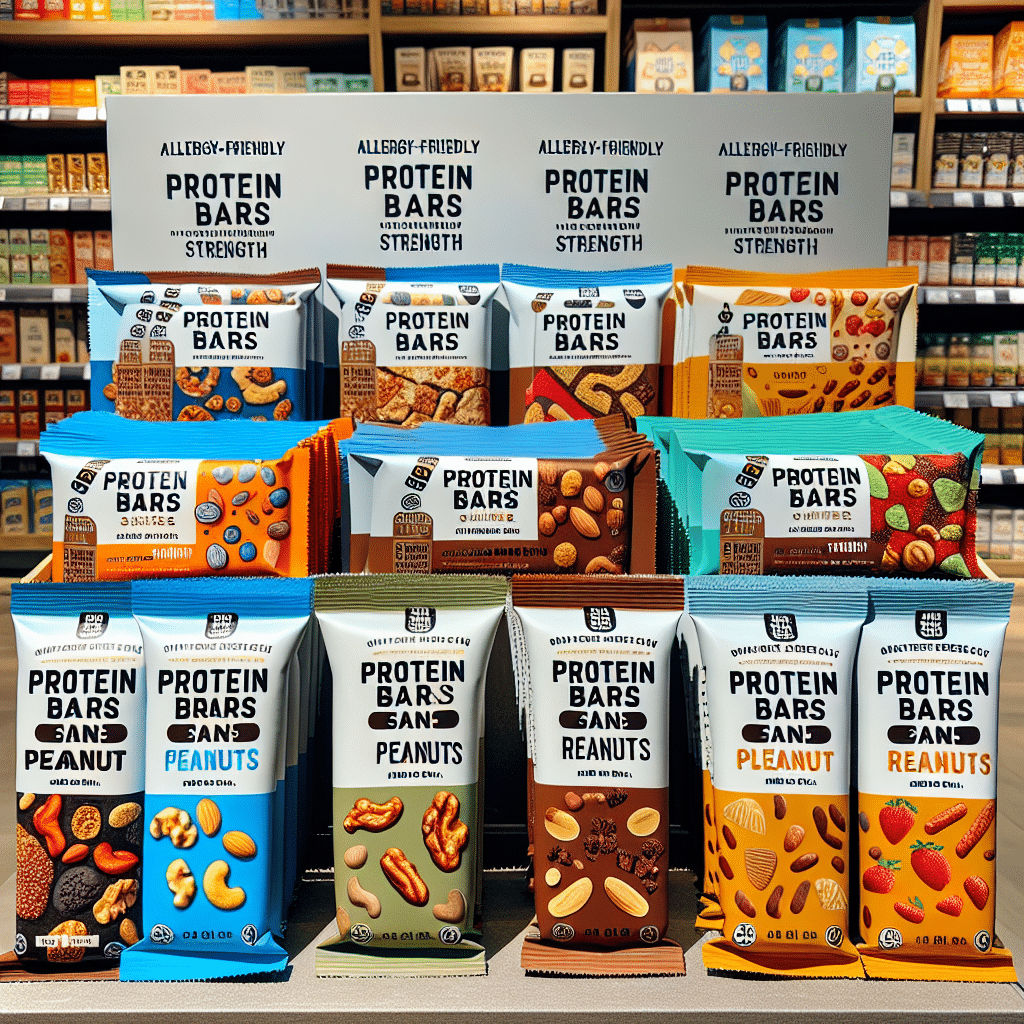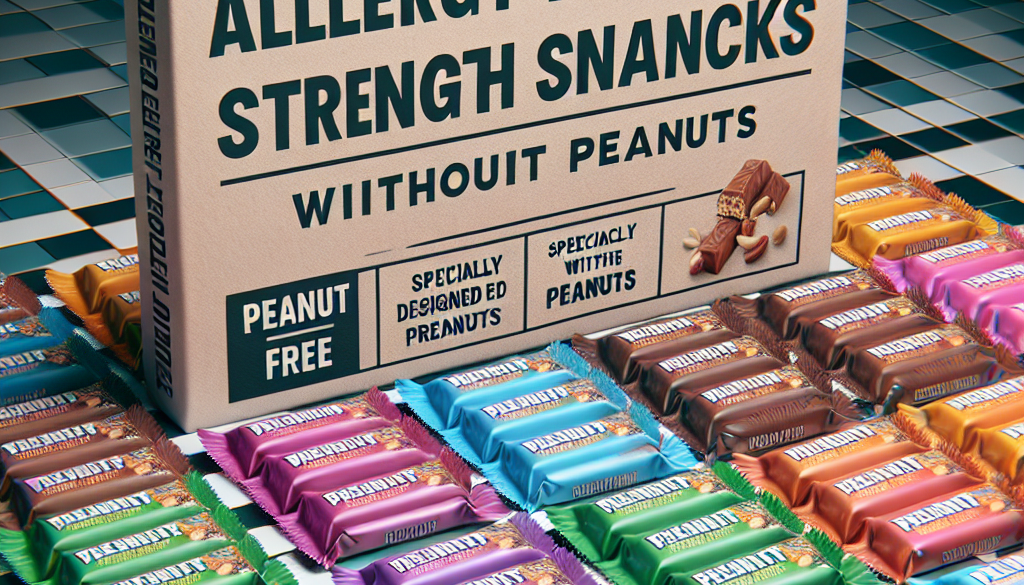Protein Bars Without Peanuts: Allergy-Friendly Strength Snacks
-
Table of Contents
- Protein Bars Without Peanuts: Allergy-Friendly Strength Snacks
- Understanding Peanut Allergies and Their Impact
- The Rise of Allergy-Friendly Protein Bars
- Key Ingredients in Peanut-Free Protein Bars
- Benefits of Peanut-Free Protein Bars
- Popular Peanut-Free Protein Bar Brands
- Considerations When Choosing Peanut-Free Protein Bars
- Case Studies: Success Stories of Peanut-Free Protein Bars
- Conclusion: The Future of Allergy-Friendly Snacking
- Discover ETprotein’s Allergy-Friendly Protein Products
Protein Bars Without Peanuts: Allergy-Friendly Strength Snacks

For individuals with peanut allergies, finding safe, nutritious, and convenient snack options can be a challenge. Protein bars are a popular choice for those looking to fuel their bodies, especially after workouts or during busy days. However, many protein bars on the market contain peanuts or are produced in facilities that handle peanuts, posing a risk for those with allergies. This article explores the world of peanut-free protein bars, offering allergy-friendly alternatives that don’t compromise on taste or nutritional value.
Understanding Peanut Allergies and Their Impact
Peanut allergies are among the most common food allergies, affecting both children and adults. The severity of reactions can range from mild to life-threatening anaphylaxis. For those with peanut allergies, strict avoidance of peanuts and peanut-containing products is essential. This vigilance extends to seemingly harmless products like protein bars, which often include peanuts for their flavor and protein content.
The Rise of Allergy-Friendly Protein Bars
In response to the growing need for allergen-free options, many companies have started producing protein bars without peanuts. These bars are made in dedicated facilities where the risk of cross-contamination is minimized or eliminated. They provide a safe alternative for those with peanut allergies, as well as for people who prefer to avoid peanuts for other reasons.
Key Ingredients in Peanut-Free Protein Bars
When peanuts are off the table, protein bar manufacturers turn to a variety of other protein-rich ingredients to create their products. Some of the most common include:
- Soy protein isolate
- Whey protein concentrate or isolate (for those who are not dairy-sensitive)
- Plant-based proteins such as pea protein, rice protein, or hemp protein
- Seeds like sunflower, chia, or pumpkin seeds
- Nuts other than peanuts, such as almonds or cashews (for those without tree nut allergies)
These ingredients not only provide the necessary protein but also contribute to the overall flavor and texture of the bars.
Benefits of Peanut-Free Protein Bars
Peanut-free protein bars offer several advantages, making them an excellent choice for many consumers:
- Allergy safety: They provide a safe option for those with peanut allergies.
- Convenience: Like their peanut-containing counterparts, these bars are portable and easy to consume on the go.
- Nutritional value: They are often packed with other nutrients such as fiber, healthy fats, and vitamins.
- Variety: There is a growing range of flavors and textures available, catering to different tastes and dietary preferences.
Popular Peanut-Free Protein Bar Brands
Several brands have made a name for themselves in the peanut-free protein bar market. Some notable examples include:
- Enjoy Life: Known for their commitment to allergy-friendly foods, Enjoy Life offers a selection of bars free from the top 8 allergens, including peanuts.
- RXBAR: While not all RXBARs are peanut-free, they offer specific flavors that exclude peanuts and are clearly labeled.
- No Cow: These vegan protein bars are dairy-free and peanut-free, relying on plant-based proteins.
- 88 Acres: Specializing in seed-based bars, 88 Acres crafts delicious snacks without peanuts, tree nuts, gluten, dairy, soy, and more.
These brands are just a few examples of companies that prioritize allergy safety without sacrificing quality or taste.
Considerations When Choosing Peanut-Free Protein Bars
When selecting a peanut-free protein bar, there are several factors to consider:
- Ingredient transparency: Look for bars that clearly list all ingredients and allergen information.
- Protein content: Ensure the bar provides an adequate amount of protein for your dietary needs.
- Sugar content: Some bars can be high in sugar, so opt for those with lower sugar content or natural sweeteners.
- Dietary restrictions: If you have other dietary concerns, such as gluten intolerance or veganism, check that the bar meets these requirements.
- Taste and texture: Choose flavors and textures that you enjoy to make your snack time more pleasurable.
Case Studies: Success Stories of Peanut-Free Protein Bars
Many consumers with peanut allergies have found success incorporating peanut-free protein bars into their diets. For example, a study published in the Journal of Allergy and Clinical Immunology highlighted the positive impact of introducing allergen-free snacks into the diets of children with multiple food allergies. These snacks, including protein bars, improved the children’s overall nutrition and quality of life.
Another case study involves a professional athlete with a peanut allergy who relies on peanut-free protein bars for quick energy and recovery. By choosing brands that guarantee peanut-free production, the athlete can maintain peak performance without fear of allergic reactions.
Conclusion: The Future of Allergy-Friendly Snacking
The demand for peanut-free protein bars is a testament to the growing awareness and accommodation of food allergies. As more companies enter the market with innovative and delicious options, individuals with peanut allergies can enjoy the convenience and nutritional benefits of protein bars without fear. With careful selection and attention to ingredients, peanut-free protein bars can be a staple in the diet of anyone looking for a healthy, allergy-friendly snack.
Discover ETprotein’s Allergy-Friendly Protein Products
If you’re looking for high-quality, allergy-friendly protein sources to create your own snacks or to incorporate into your products, ETprotein offers a range of options. Their organic bulk vegan protein and plant proteins are free from common allergens, non-GMO, and feature a neutral taste, making them ideal for various applications.
ETprotein’s commitment to quality and safety makes them a trusted supplier for consumers and businesses alike. Whether you’re developing your own line of protein bars or seeking reliable protein sources for dietary supplements, ETprotein has the expertise and product range to meet your needs.
About ETprotein:
ETprotein, a reputable protein Chinese factory manufacturer and supplier, is renowned for producing, stocking, exporting, and delivering the highest quality organic bulk vegan protein and plant proteins. They include Organic rice protein, clear rice protein, pea protein, clear pea protein, pumpkin seed protein, sunflower seed protein, mung bean protein, peanut protein etc. Their offerings, characterized by a neutral taste, non-GMO, allergen-free attributes, cater to a diverse range of industries. They serve nutraceutical, pharmaceutical, cosmeceutical, veterinary, as well as food and beverage finished product distributors, traders, and manufacturers across Europe, USA, Canada, Australia, Thailand, Japan, Korea, Brazil, and Chile, among others.
ETprotein specialization includes exporting and delivering tailor-made protein powder and finished nutritional supplements. Their extensive product range covers sectors like Food and Beverage, Sports Nutrition, Weight Management, Dietary Supplements, Health and Wellness Products, and Infant Formula, ensuring comprehensive solutions to meet all your protein needs.
As a trusted company by leading global food and beverage brands and Fortune 500 companies, ETprotein reinforces China’s reputation in the global arena. For more information or to sample their products, please contact them and email sales(at)ETprotein.com today.












